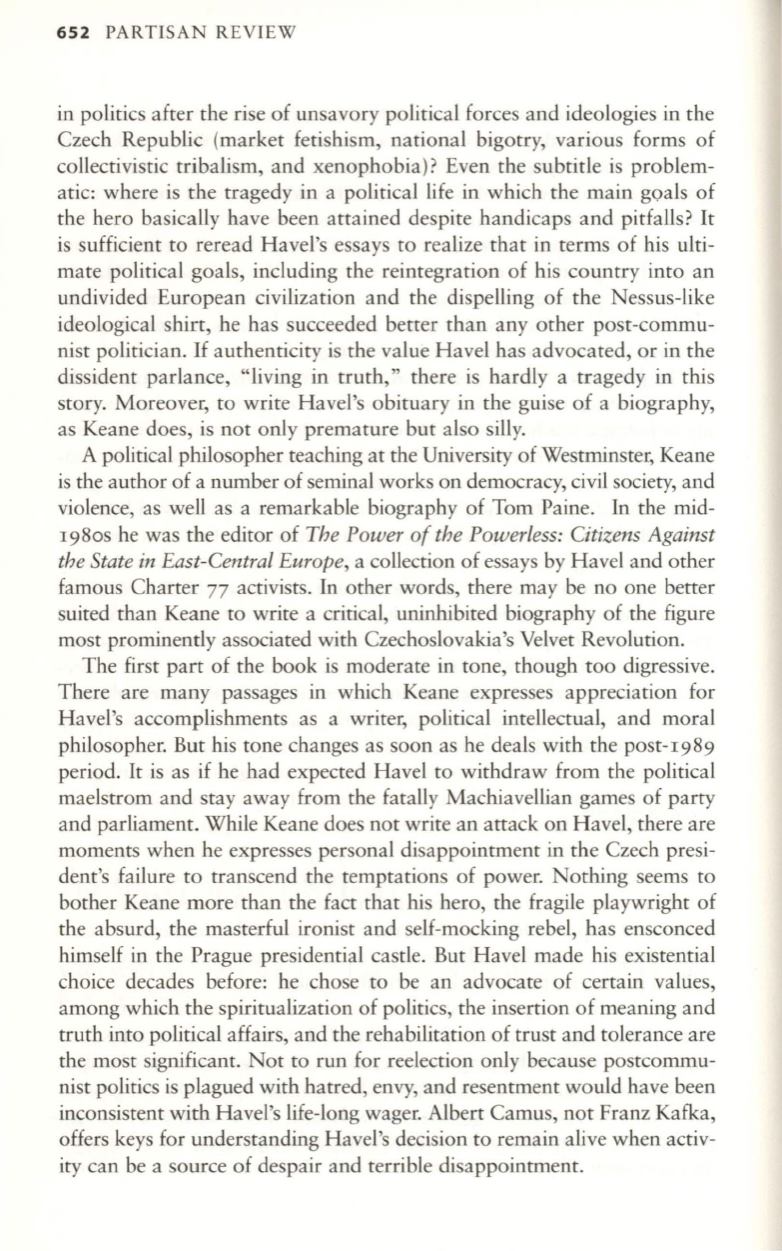
652
PARTISAN REVIEW
in politics after the rise of unsavory political forces and ideologies in the
Czech Republic (market fetishism, national bigotry, various forms of
collectivistic tribalism, and xenophobia)? Even the subtitle is problem–
atic: where is the tragedy in a political life in which the main goals of
the hero basically have been attained despite handicaps and pitfalls? It
is sufficient to reread Havel's essays to realize that in terms of his ulti–
mate political goals, including the reintegration of his country into an
undivided European civilization and the dispelling of the Nessus-like
ideological shirt, he has succeeded better than any other post-commu–
nist politician.
If
authenticity is the value Havel has advocated, or in the
dissident parlance, "living in truth," there is hardly a tragedy in this
story. Moreover, to write Havel's obituary in the guise of a biography,
as Keane does, is not only premature but also silly.
A political philosopher teaching at the University of Westminster, Keane
is the author of a number of seminal works on democracy, civil society, and
violence, as well as a remarkable biography of Tom Paine. In the mid-
1980s he was the editor of
The Power of the Powerless: Citizens Against
the State in East-Central Europe,
a collection of essays by Havel and other
famous Charter
77
activists. In other words, there may be no one better
suited than Keane to write a critical, uninhibited biography of the figure
most prominently associated with Czechoslovakia's Velvet Revolution.
The first part of the book is moderate in tone, though too digressive.
There are many passages in which Keane expresses appreciation for
Havel's accomplishments as a writer, political intellectual, and moral
philosopher. But his tone changes as soon as he deals with the post-1989
period. It is as if he had expected Havel to withdraw from the political
maelstrom and stay away from the fatally Machiavellian games of party
and parliament. While Keane does not write an attack on Havel, there are
moments when he expresses personal disappointment in the Czech presi–
dent's failure to transcend the temptations of power. Nothing seems to
bother Keane more than the fact that his hero, the fragile playwright of
the absurd, the masterful ironist and self-mocking rebel, has ensconced
himself in the Prague presidential castle. But Havel made his existential
choice decades before: he chose to be an advocate of certain values,
among which the spiritualization of politics, the insertion of meaning and
truth into political affairs, and the rehabilitation of trust and tolerance are
the most significant. Not to run for reelection only because postcommu–
nist politics is plagued with hatred, envy, and resentment would have been
inconsistent with Havel's life-long wager. Albert Camus, not Franz Kafka,
offers keys for understanding Havel's decision to remain alive when activ–
ity can be a source of despair and terrible disappointment.


